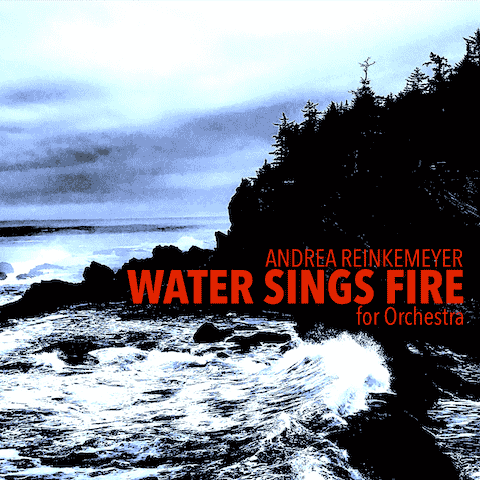Water Sings Fire
For women who sing truth, though the world rains fire upon them
Instrumentation
3(P)2(E.hn.)3(Bs)2(CB) / 4331 / timp 3perc* hp / str
Piccolo, 2 Flutes, 2 Oboes (English Horn), 2 Clarinets in B-flat, Bass Clarinet, Bassoon, Contrabassoon / 4 Horns in F, 3 Trumpets in C, 2 Tenor Trombones, 1 Bass Trombone, Tuba / Timpani, 3 Percussion*, Harp / Strings
* Percussion 1: Vibraphone, Triangle; Percussion 2: Tam-tam, Bongos; Percussion 3: Concert Bass Drum, Wind Gong, Triangle
Program Notes
Water Sings Fire for Orchestra (2018) was commissioned by the League of American Orchestras and the Louisiana Philharmonic Orchestra with the generous support of the Virginia B. Toulmin Foundation Orchestral Commissions Program. Carlos Miguel Prieto conducted the Louisiana Philharmonic Orchestra for the premiere performances at the Orpheum Theatre in New Orleans, Louisiana in January 2019.
The piece draws inspiration from Leigh Bardugo’s short story, When Water Sang Fire – a feminist origin myth to the Hans Christian Andersen classic, The Little Mermaid – in which themes of ambition and betrayal are explored allegorically through Ulla’s transformation from obscure mermaid to tempestuous sea witch.
With nimble precision, Ulla manipulates the mer-music’s magical properties - a show of power irresistible to an ambitious prince whose lack of natural talent drives his relentless pursuit of the throne. In the end, Ulla’s ability to transform wishes into reality rewards the treachery of the young prince, and it costs her everything.
The loss of her voice, friend, and form illustrate the degradation of her true source of personal power. Desperate to survive, Ulla uses a magical mirror to amplify her weakened voice with the support of “all these broken, betrayed girls” reflected in the mirror. Together, they build a song of storm magic to pull apart the prince’s ill-begotten prize.
Bardugo writes that following Ulla’s descent, she clutches her memories, and “…held each sorrow like a chafing grain of sand, and grew her grudges like pearls.”
While this piece does not strictly adhere to the narrative arc of the story, its episodic form strings together grievances, while Ulla, who frets in the deep, waits for the “lonely, the ambitious, the clever, the frail, for all those willing to strike a bargain. She never waits long.”
Like the story, the sparse textures of the opening moments conjure the barren lands stripped of life by Ulla’s storm, and slowly builds with the sorrow of each painful memory re-lived. The themes resonate with societal changes that challenge our nation – as we strive to give voice to the wronged and the disenfranchised. The work is dedicated, with hope and with gratitude, to “women who sing truth though the world rains fire upon them.” Duration ca. 12:00
— Notes by Andrea Reinkemeyer and Kate Verotsky
.webp)
View a video of the GMU performance at this link (first piece).
Her music displays evocative imagery and a delight in luminous orchestral colors. . . . Reinkemeyer’s score interweaves dramatic clusters of sound with lyrical moments, playing with structures of rebellion and disruption. In doing so, it finds a striking musical language for processes of transformation and self-empowerment.
. . . “Water Sings Fire,” a marvelously dark and affecting work
I was struck most with Water Sings Fire . . . the music conjures images of pitch-black alleys and desolate landscapes. I could envision Ulla walking this ground, alone at night, and absorbing the motivations of everyone, including herself, that has led to this destruction.



